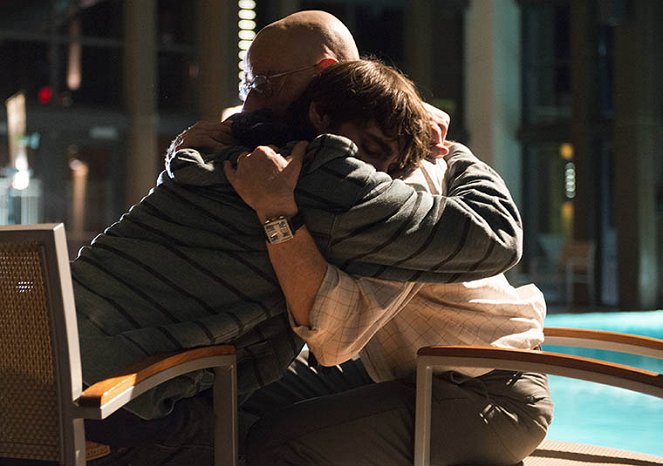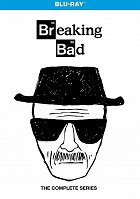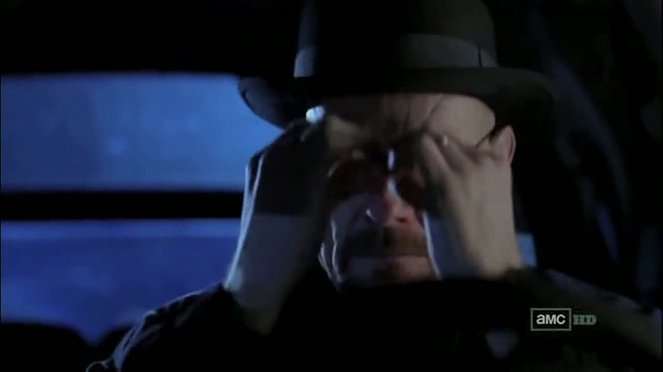Creators:
Vince GilliganComposer:
Dave PorterCast:
Bryan Cranston, Aaron Paul, Anna Gunn, Dean Norris, Betsy Brandt, RJ Mitte, Bob Odenkirk, Jonathan Banks, Giancarlo Esposito, Jesse Plemons (more)VOD (3)
Seasons(5) / Episodes(62)
Plots(1)
To "break bad," as says the old colloquialism from the American South, is to go so wrong it's almost impossible to do what's right. Walter White is breaking bad. Recently diagnosed with Type III lung cancer, raising a son with cerebral palsy, and in need of a way to support his family, Walter uses his skills to transform himself from nebbishy high-school chemistry teacher to neophyte crystal-meth cook in the blink of an eye. Things become problematic when, not long after Walter and his former student Jesse put together a lucrative cooking operation, the two of them of are assaulted by a pair of drug dealers who accuse Walter of being affiliated with the DEA. But that’s just the beginning of his problems: he soon has a dead body on his hands and has yet to even reveal his cancer to his loving wife. (official distributor synopsis)
(more)Videos (12)
Reviews (9)
Breaking Bad is a series that is beyond reproach. A perfect story with brilliant acting, completely unpredictable and, most importantly, perfectionist in every detail. Emotions were stirring in me after almost every episode. I didn't even know who to (shall we say) root for, because there are no good guys in the story, or there are, but the rate at which Walter White drags them down to darkness is unbelievable. There’s a very thin line between good and evil here, and it just blows your mind to see Walter White turn from an ordinary, humble guy into a complete monster, realizing that life can be too damn short, so he’d better enjoy his last months without taking any shit from anybody, and finally be the one in charge. The final episodes of each season are absolutely perfect, but I could watch the episode about the train heist every day. I don't know what else to add. No other show on TV comes even close to Breaking Bad in terms of story sophistication. S01: 9/10. S02: 9/10. S03: 10/10. S04: 10/10. S05: 10/10.
()
Season one:An excellent story and absolutely great transformation of the main protagonist. That great swine, life is the main villain here throwing not just sticks, but reinforced concrete joists in our way to trip us up. Superb. Season two: To cut a long story short, this is the real take off. The creators set to work and drive Walt towards his unexpected future. + Perfect cameo by Danny Trejo.Season three: The slightly weaker take off makes fertile land for the final harvest. You can’t just end a season like that, can you? It’s cruelty. Season four: An unbelievably full-on season that sets the bar so high that I don’t know if anybody will be able to jump over it in the future. And adrenaline finale, the final revelation and masterful acting performances make this season a milestone in this series. "I won." Season five: Some darn good meth is going around Prague these days... Walt’s rise to the top and definitive transformation into a drug kingpin shows us that the end is nigh. And it’s going to end spectacularly... A year later. The second half of the season really floors the gas pedal and the last five or so episodes sets a new, higher standard for TV production. Faultlessly written, ingenious tension build-up with a very satisfying ending. Anna Gunn delivered one of the best female acting performances (well-deserved Emmy). And the whole thing stands on Bryan Cranston’s shoulders. The final episode is hosted exclusively by him and the farewell is classy. I enjoyed the final moments of the series with a satisfied smile on my lips and a chill down my spine all at once.
()
A television series written and filmed with the same conscientiousness with which Walt cooks Blue Sky. The following selection from the SPOILER-packed observations that I have written over the course of all five seasons isn’t intended to be a comprehensive analysis, but a means of partially covering what makes up the extraordinary nature of Gilligan’s achievement by breaking down several constituent aspects of the series. ___ Throughout the series, the development of the narrative seems to be determined by Heisenberg’s principle of uncertainty. Based on the anticipated direction of development (from victim of external events to manipulative monster), it’s impossible to guess when something will go south and who will undergo a change in personal character. Breaking Bad is not accommodating toward viewer expectations in that it rejects the usual narrative formula. It disconcerts us with its efforts to raise the plausibility of ongoing events, creating the impression that almost anything could happen. However, it does not discourage us from forming our own hypotheses. On the contrary, through the “forward looking” scenes in the prologue, it rather encourages us to actively insert what we see into the narrative as a whole. Suspense is created based not only on the viewer’s uncertainty with respect to what will happen, but also on the knowledge of what the character knows or doesn’t know. The series’ creators work with multiple narrative focal points and pit the characters conflicting interests against each other, so that the characters frequently have to face risks coming from different areas (immediate and extended family, institutions, the underworld). The transformation of our perception of the characters is tied to what we know of them, how much we respect them and how many moral transgressions we are willing to forgive them for. It is fascinating to watch the purposeful “dirtying” of the protagonists. In the final season, it will be hard for you to find a character who is without guilt. The increasing risks taken force the characters to think farther ahead, thus making them better players. The self-stylisation and pretence don’t do any good for Jesse in particular, who is perhaps the weakest personality, but he is also the one to whom the most powerful cathartic effect is bound in the final episode. ___ The real antagonist of most of the characters is their own potential, which they either fail to fulfil (through their own fault and that of the system, which repeatedly discourages them) or they fulfil it at a disproportionate cost. The protagonists are also united by their ambiguity. Each of them can step out of his role, whether he accepted it voluntarily or under duress. Because nothing is fixed and we are forced to assess the given choices of a given character in the context of his previous actions, it is possible to also doubt Walt’s admission in the final episode that taking care of his family was only a pretext for choosing a life of crime (on which he embarked for his own selfish reasons, not to provide for his wife and son). Was his motivation from the beginning really anything other than power and money? We are aided in the reassessment of our opinions on the characters by the use of parallels (Hank as a substitute father for Walt Junior, Walt as a substitute father for Jesse), which lead us to see similar situations in different contexts and point to some key themes of the series. ___ Through his career as a drug kingpin, Walt vents the aggression that he has built up from numerous sources. He failed as the breadwinner of his family, nor did he fulfil expectations as a father figure (his son gets advice on how to be a man from Hank). Through his other life, he also compensates for the breakdown of his own body. He makes money outside of the system also because he was excluded from it due to his illness. He is rejected by society because, as a person with cancer, he signifies death (the “other”). Cooking meth makes it possible for him to overcome the substitute father and husband figures and to put his exceptional intellect to use at least outside of the official structure. He holds on to his faith in the traditional, or rather obligatory model of the family for a long time. Only in the series finale, no longer bound by anything, all-powerful and capable of anything, he can give full expression to his potential and fully transform into the person he was perhaps destined to become from the beginning. ____ The extraordinary thematic scope of the seasons makes Breaking Bad rewarding material for a sociological study on the anxieties of contemporary America (drugs, money, terminal disease, an ineffective social-security system). Those who want to make it cannot respect the law and must endlessly build up the façade of an upstanding citizen through hundreds of small lies. Many times, the series relativises the distinction between “big” lies with broad reach and small family lies. Hypocrisy is the essence of both. Instead of learning greater openness, the protagonists become ever more adept at constructing alternate worlds and coming up with reasonable stories (Walt as a gambler). As everyone gradually finds out, however, the real drama plays out behind these false fronts. It is fascinating to watch how the screenwriters lead the characters into a multi-level web of lies and how they deal with their various degrees of knowledge about the existence of particular worlds and their supposed inhabitants, family, the underworld; these worlds are at first more distinctly different also artistically, but all of them gradually “darken” into the same colour palette). ___ Breaking Bad is also extremely satisfying in terms of its style, which changes not only in the course of single episodes, but also in individual scenes (through recontextualization and/or the revealing of new information, we are prompted to see a given scene from a different perspective). With the graphic continuity of shots, action played out on multiple planes and creation of meanings through camera positioning and movement, the series’ creators succeeded in doing much more than many Hollywood productions with a hundred times the budget. I could endlessly watch the Scorsese-inspired edited collages, while the emblematic space of New Mexico hasn’t been used for such a thrilling dusting off of classic western motifs (the train robbery) for years, and in terms of directing, the final episode can boldly compete with any of Hitchcock’s better thrillers. There is much that could still be written, but the tone would remain just as praiseful. Breaking Bad contains so much that is positive that I consider it to be petty to mention its few minor flaws. It doesn’t often happen that a series allows you to be practically uncritical. And I give thanks for that! 100%
()
(less)
(more)
Seeing Breaking Bad makes me want to extract the ricin from the beans, but that's essentially my only complaint. This is the first series since The Wire that honestly fascinates me with its attention to plot sophistication, fictional characters, and, most importantly, absolute unpredictability. I gave up guessing the storyline halfway through the second season because there's no point. The way in which Walter White, who learns the value and brevity of human life from one day to the next, functions on both sides of the law while (un)consciously pulling in people around him is perhaps even better than in Dexter. This is mainly because the moments when we realize that he is really becoming evil are conveyed by the filmmakers through complete banality. Like ordinary marital conversations: "I'm not in danger." I am the danger!"
()
Since the days of Rest in Peace, I haven't seen a new series that could entice me this much. In particular, the transformation of the main character (I'm not going to say protagonist) is something surreal, and the way in which the screenwriters cruelly mess with viewer’s sympathies and how they don't really give a damn, is admirable. Of all the episodes, not a single one seemed useless to me, there were no blank spots in any of them, although there was talk all the time, I enjoyed the precisely written dialogues as much as when the characters were just looking at each other and the tension thickened. It was an excellent fifty hours.
()
Gallery (939)
Photo © AMC / Ursula Coyote



Ads